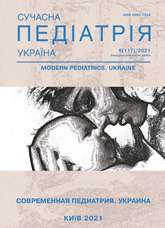Clinical case of severe coronavirus infection in a 6-month-old child
DOI:
https://doi.org/10.15574/SP.2021.117.77Keywords:
COVID-19, children, virus-induced respiratory distress syndrome, gene polymorphism, surfactant administrationAbstract
Nowadays, the creation of treatment protocols for young children with COVID-19 is especially relevant, as some issues of pathogenesis and genetic determinism of severe lung damage are still unclear. COVID-19-induced respiratory distress syndrome is a predictable severe complication that requires early diagnosis and proper treatment. Given the pathogenetic mechanism of lung damage in COVID-19, surfactant replacement therapy may be useful in the treatment of this cohort of patients.
Clinical case. A clinical case of severe coronavirus infection caused by SARS-CoV-2 in a 6-month-old child is presented. The course of the disease was accompanied by severe damage to the lung parenchyma with the development of acute respiratory distress. The examination of the patient confirmed the genetic determinism of severe COVID-19, polymorphic risk alleles of the genes GSTM1, GSTP1, SFTP-B. The child's treatment included not only long-term mechanical ventilation, but also surfactant replacement therapy. The child recovered and was discharged without signs of respiratory failure.
Conclusions. This clinical case demonstrates the association of genetic polymorphism with severe virus-induced lung damage. Because severe respiratory failure in COVID-19 is likely to be due to the development of acute respiratory distress syndrome, administration of exogenous surfactant should be considered as a possible treatment option.
The research was carried out in accordance with the principles of the Helsinki declaration. The informed consent of the patient was obtained for conducting the studies.
No conflict of interest was declared by the authors.
References
Cattel F, Giordano S, Bertiond C et al. (2021). Use of exogenous pulmonary surfactant in acute respiratory distress syndrome (ARDS): Role in SARS-CoV-2-related lung injury. Respiratory Physiology and Neurobiology. 1: 288. https://doi.org/10.1016/j.resp.2021.103645; PMid:33657448 PMCid:PMC7916525
Fryer AA, Bianco A, Hepple M et al. (2000). Polymorphism at the glutathione S-transferase GSTP1 locus. A new marker for bronchial hyperresponsiveness and asthma. Am J Resp Crit Care Med. 161: 1437-1442. https://doi.org/10.1164/ajrccm.161.5.9903006; PMid:10806136
Khan MSI, Debnath CR, Nath PN et al. (2020). Ivermectin Treatment May Improve the Prognosis of Patients With COVID-19. Arch Bronconeumol (Engl Ed). 56 (12): 828-830. https://doi.org/10.1016/j.arbres.2020.08.007
Moradi M, Mojtahedzadeh M, Mandegari A et al. (2009). The role of glutathione-S-transferase polymorphisms on clinical outcome of ALI/ARDS patient treated with N-acetylcysteine, Respiratory Medicine. 103 (3): 434-441. https://doi.org/10.1016/j.rmed.2008.09.013; PMid:18993042
Skokic F, Hudic I, Hotic N et al. (2010). Surfactant replacement therapy in influenza A H1N1. The Pediatric infectious disease journal. 29 (4): 387. https://doi.org/10.1097/INF.0b013e3181cf2eaa; PMid:20351534
Tian S, Xiong Y, Liu H et al. (2020). Pathological study of the 2019 novel coronavirus disease (COVID-19) through postmortem core biopsies. Mod Pathol. 33: 1007-1014. https://doi.org/10.1038/s41379-020-0536-x; PMid:32291399 PMCid:PMC7156231
Wang J, Hajizadeh N, Moore EE et al. (2020). Tissue plasminogen activator (tPA) treatment for COVID-19 associated acute respiratory distress syndrome (ARDS): A case series. J Thromb Haemost. 18: 1752-1755. https://doi.org/10.1111/jth.14828; PMid:32267998 PMCid:PMC7262152
Xu Z, Shi L, Wang Y et al. (2020). Pathological findings of COVID-19 associated with acute respiratory distress syndrome. The Lancet. Respiratory medicine. 8 (4): 420-422. https://doi.org/10.1016/S2213-2600(20)30076-X
Ye Z, Zhang Y, Wang Y et al. (2020). Chest CT manifestations of new coronavirus disease 2019 (COVID-19): a pictorial review. Eur Radiol. 30: 4381-4389. https://doi.org/10.1007/s00330-020-06801-0; PMid:32193638 PMCid:PMC7088323
Znamenska TK, Kovaliova OM, Pokhylko VI et al. (2015). Association of genetic polymorphisms with risk factors for bronchopulmonary dysplasia in premature birth infants. New Armenian Medical Journal. 9 (3): 48-57.
Downloads
Published
Issue
Section
License
Copyright (c) 2021 Modern pediatrics. Ukraine

This work is licensed under a Creative Commons Attribution-NonCommercial 4.0 International License.
The policy of the Journal “MODERN PEDIATRICS. UKRAINE” is compatible with the vast majority of funders' of open access and self-archiving policies. The journal provides immediate open access route being convinced that everyone – not only scientists - can benefit from research results, and publishes articles exclusively under open access distribution, with a Creative Commons Attribution-Noncommercial 4.0 international license (СС BY-NC).
Authors transfer the copyright to the Journal “MODERN PEDIATRICS. UKRAINE” when the manuscript is accepted for publication. Authors declare that this manuscript has not been published nor is under simultaneous consideration for publication elsewhere. After publication, the articles become freely available on-line to the public.
Readers have the right to use, distribute, and reproduce articles in any medium, provided the articles and the journal are properly cited.
The use of published materials for commercial purposes is strongly prohibited.

